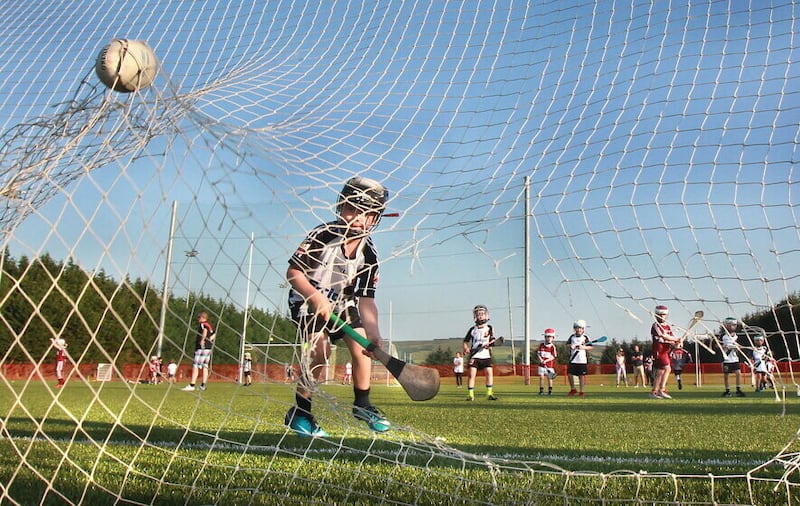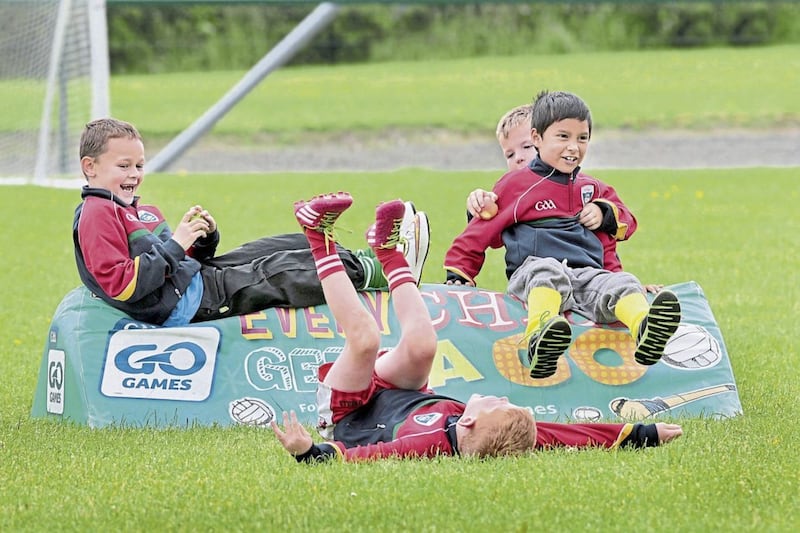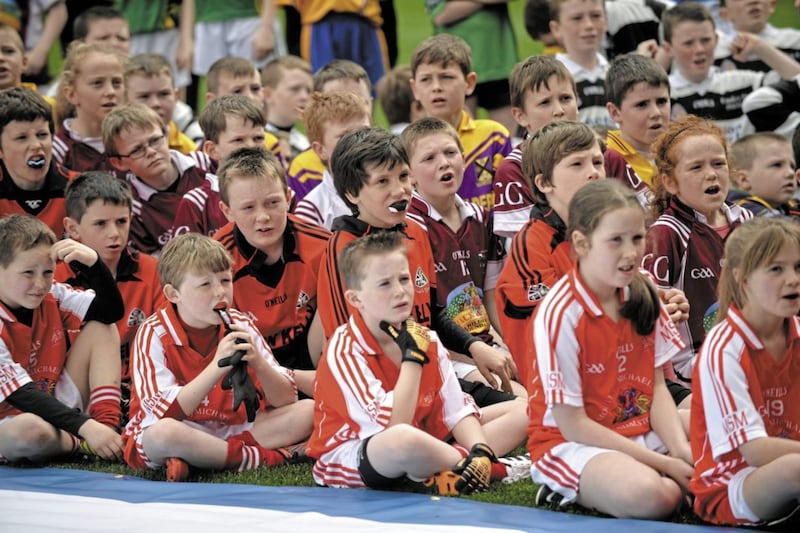IT is going on 26 years ago. I still haven't forgiven Niall O'Hara.
There was no such thing as U8 or U10 or Go Games then. Everyone's first introduction to Gaelic football is at U12. If you were ready, you were ready.
We were playing Magilligan. A kind of squalid Saturday morning that would kill a football's enthusiasm to hop back up off the turf.
The ball comes down the right-hand side of the goal we're attacking, towards the Gortnaghey Road end.
Niall O'Hara picked the ball up and shovelled it off to me. I cut on to the left and with all of my three-foot frame, smashed the size 4 ball with all my might. It squirmed through the goalkeeper's legs.
Toot.
EP Cassidy has the whistle in his mouth, the long right arm pointing out towards Ballyhargan.
O'Hara had scooped the ball clean off the deck. My first ever goal, disallowed.
I still remember the score that day. 64-2 we beat them, whatever that translated as in goals and points.
I'd say if you added up every point we scored in the rest of my time playing underage football, they would hardly amount to 64.
Core memories, eh?
A story posted on The Irish News website on Tuesday evening turned into a national debate on how and when to introduce competitiveness into underage sport.
All it has done is turned the floodlights on above a trail of breadcrumbs that the GAA's leadership had been leaving around in recent months.
Last December, Central Council renewed its Go Games policy.
In his annual report released in February, director-general Tom Ryan dedicated a chunk of text to the Go Games, labelling them "one of our greatest successes in recent times".
"Worryingly, however, that philosophy is coming under threat of late…In too many instances, we are failing to live up to our creed.
"Too much 'meaning' is being assigned to games for the 7-11 age cohort. Where blitzes and fun predominated, we now see the emergence of leagues for such age groups.
"We also have the growing emergence of unofficial tournaments which are being treated as All-Irelands for children as young as 10 years of age or younger. We hear of the 'best' children playing while others are left on the sideline," he wrote.
Speaking to reporters at Congress later that month, GAA president Larry McCarthy referenced the High Court case that had just been resolved between a Dublin family and the Fingallians club.
It arose from an U9 blitz held in Newry and resulted in the parents suing the club over a lack of playing time for their child.
"The over-emphasis on winning at such a young age is totally anathema to the philosophy of Go Games, is damaging to children, and deters people from involvement in the Association. Fun is good."
It is a very polarising debate, as the last week has shown.
You can see it from both sides.
Literature, including the GAA's own, would tell you that participation levels have increased in the last 20 years.
Is that all down to the Go Games though?
Or is it at least in part the push that's been made in big urban areas?
Rural participation has always been strong at that age and certainly isn't showing any signs of weakening.
In Sweden, they adopted the United Nations Convention on the Rights of the Child in 2020, thereby enshrining into law the necessity for children to be offered sport should they wish to avail of it.
Article 3 of the convention states that "it is the child's best that should be a priority around anything where children are involved."
The child has to be the priority, United Nations Convention or not.
That's where a lot of this debate around the GAA comes down hard on top of the fence and has to fall to one side or the other.
Competition and competitiveness have been fused and confused.
Are the trophies and finals for the good of the child?
There is no easy answer because we're throwing a blanket over the entire populace under the age of 12 and saying they all need this or they all need that.
Kids are all different. Competition in our house of five boys could be fierce over nothing.
Once the younger brother hit me over the head with a wee shovel because I got the letters off the postman before he could get there.
It is hard-wired into human nature, but it can manifest itself in very different ways.
Removing the element of competition from underage games is basically a judgement call that places the needs of those who haven't yet discovered their hard edge over those that have.
It's probably the right thing to do, up until a certain point.
Is 12 years of age too old? Possibly. The schooling system here is different from the Republic but by then, a lot of our kids have been through the 11-plus and had the next step of their educational future decided for them.
They're first year in secondary school. Some of them will have hit puberty.

When I lifted my phone a few hours after the story was posted, it was flooded with messages. One in particular stood out. It told of an U9 blitz recently where there was a fight between adults.
One team arrived with nine coaches for an U9 team. Most clubs agreed to mix the ability of their teams but one club refused and went for an 'A' team and a 'B' team.
You might say they're the minority, and they are, but it only takes one bad apple. Everyone else looks at them and thinks 'If we don't go A and B as well, we'll get tanked here', and so the spiral starts.
The GAA have to get it right here. The idea of losing players to other sports was a bit of a fantasy in the past. If a 747 had landed to lift all the young boys in a wee nationalist enclave of the north and deliver them to the nearest soccer pitch, they'd have got off at their destination and walked back home to play Gaelic.
The traditional segregations in the north are slowly being chipped away at. Rugby and soccer are no longer seen as 'Protestant sports.'
The IFA had 50,000 youth football participants in 2015. They were at 77,300 in 2019 and are aiming to hit 100,000 by 2025, doubling their base in a decade.
Would the young boys in Slaughtneil or Burren or Coalisland do any different if the 747 landed today? Doubtful. But the GAA has put so emphasis on an urban strategy and it is there that soccer and rugby will harm them if they can't find the balance in this debate.
For me, it's a mixture.
Go Games would seem to be the right way to go for the vast majority of the GAA that young kids will play, because it does protect the participation of those that might not get any time on the field in a more competitive environment.
But could we not mix a bit of competition in? That probably comes down to the adults and their willingness to sign up to stricter codes of conduct.
No mentors on the line at games, silence, and 50 per cent participation for players should be a prerequisite of competitive football at that age too.
Otherwise it can't happen at all.
Thirty token seconds at the end of a game and you're back into the same problem as we had before, youngsters sitting on a hard, wooden bench just waiting to drift away at far too young an age.
Beyond football, there's the social isolation caused by that. There's nothing more cruel than seeing a young lad mad for the sport but maybe not at the standard leaving the place where all his friends congregate because he's sick of the hurt and embarrassment of being made to feel so inferior.
Youngsters have to learn to win and lose in life, because there will be plenty of disappointment to meet them when they're older. Sport is a means by which we can equip them.
Being competitive and being in a competition are two different things, and it's the adults trying to make them into the one.
It is the adults who continue to be the problem for which there is no obvious solution.
This is maybe just the way it has to be.






